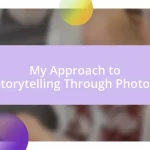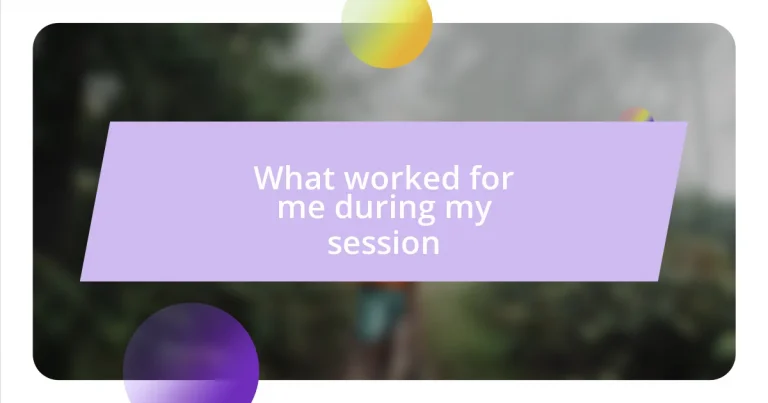Key takeaways:
- Preparation through detailed planning and environment setting enhances confidence and focus.
- Embracing adaptability and self-compassion during challenges fosters authentic connections with the audience.
- Incorporating feedback and setting actionable goals post-session drives continuous improvement and growth.
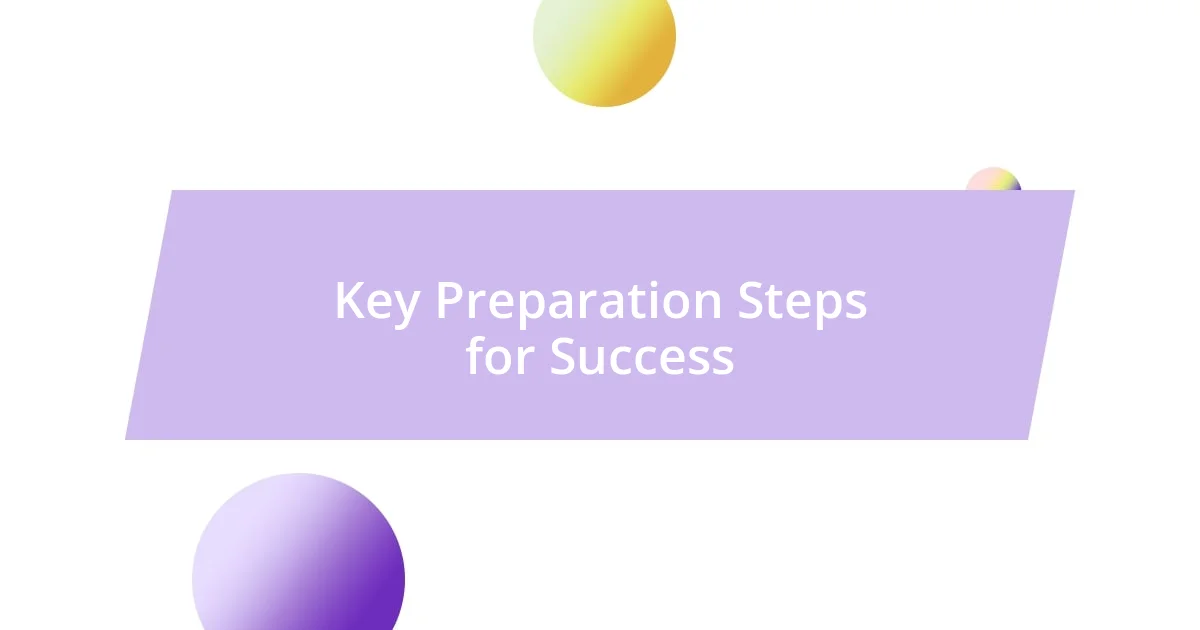
Key Preparation Steps for Success
One of the most effective preparation steps I’ve found is creating a detailed plan before my session. I remember a time when I felt anxious and scattered, but after I started outlining my goals and key points, I noticed a significant change in my confidence and clarity. Isn’t it amazing how a little structure can transform chaos into focus?
Another crucial step is setting the right environment. I’ve learned that a calm, organized space can drastically enhance my concentration and productivity. Just think about it: have you ever tried to work in a noisy or cluttered area? It’s distracting, right? Finding that perfect spot where you feel comfortable can really elevate your performance.
Lastly, I emphasize the importance of mental wellness before diving into any session. One time, I took a few minutes to engage in deep breathing exercises, and it completely shifted my mindset. Don’t underestimate how those moments of self-care can ground you—what rituals do you have to center yourself? Recognizing your emotional state and tuning into it thoroughly can make all the difference in your success.
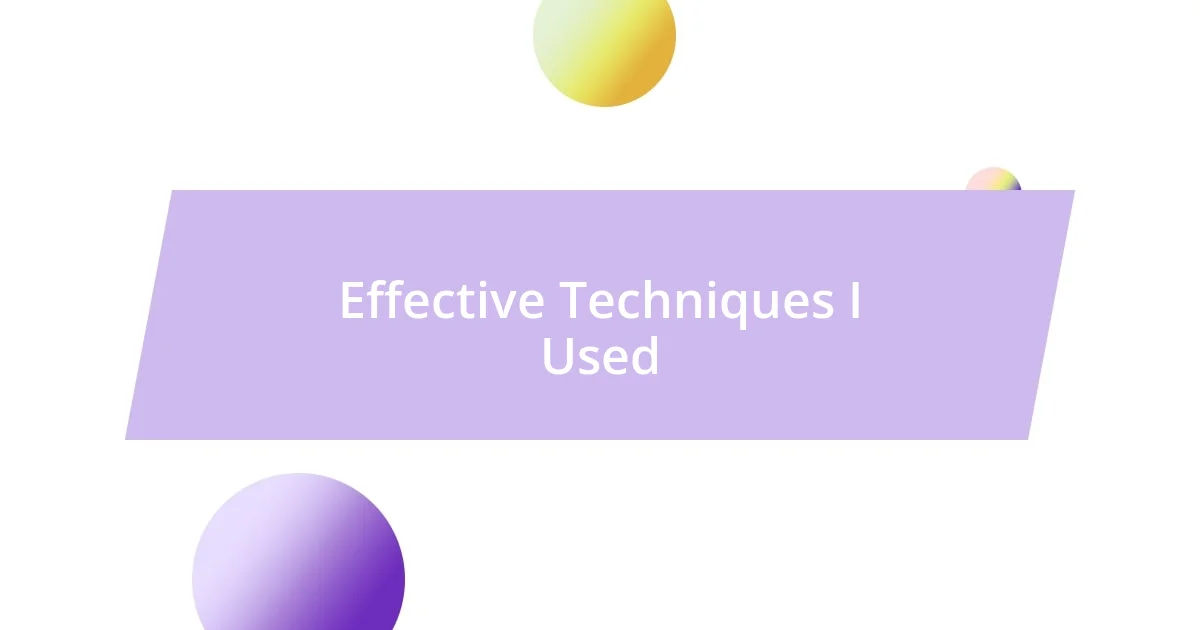
Effective Techniques I Used
In my journey, I’ve found that visualization can be a game-changer. Before a session, I take a moment to close my eyes and mentally rehearse what I’m going to say. The first time I tried this, I was surprised at how vividly I could imagine the flow of the conversation and how it eased my nerves. It’s as if I was able to practice without visibly speaking, and this technique not only prepared me for the session but also boosted my confidence significantly.
Here are a few effective techniques I’ve used:
- Journaling: Writing my thoughts down helps me process ideas and reflect on what’s important.
- Time Blocking: I allocate specific time slots for each topic I want to cover, which keeps me organized.
- Positive Affirmations: I repeat uplifting phrases to empower myself, reinforcing my self-belief.
- Active Listening: During sessions, I focus intently on others’ words to foster genuine connections and responses.
Each of these techniques has enriched my sessions profoundly, helping me stay engaged and focused!
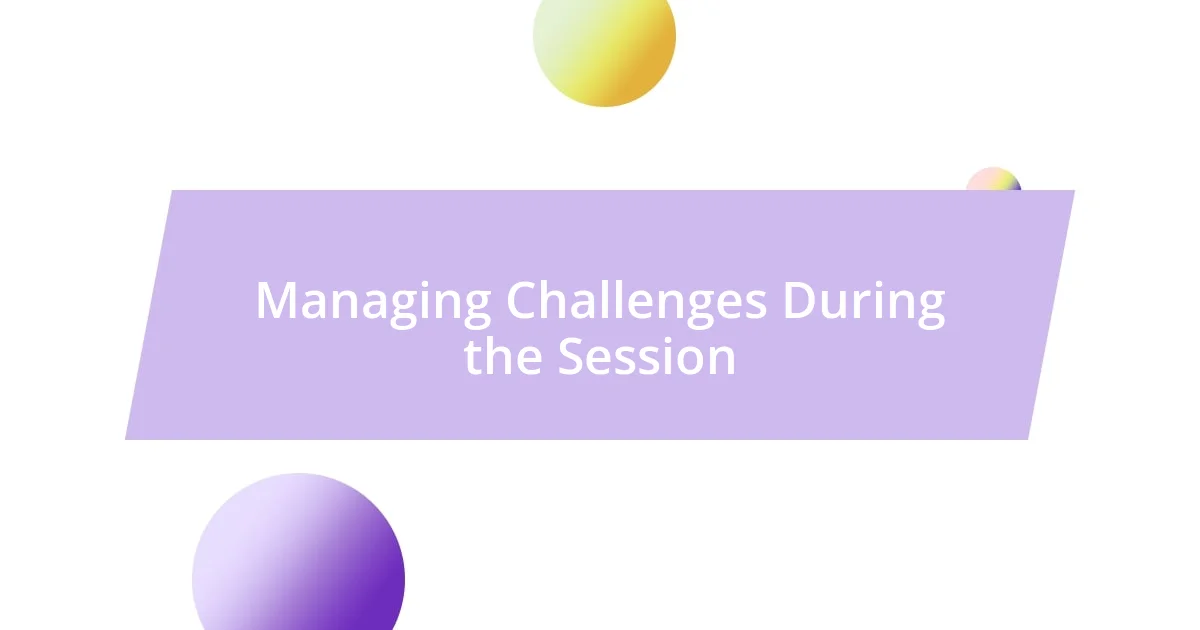
Managing Challenges During the Session
Managing challenges during the session often comes down to being adaptable. I recall a particular instance when a technical glitch disrupted my presentation. Instead of panicking, I paused, acknowledged the issue, and used the time to engage the audience in discussion. How often do we learn more from our hurdles than our successes? I’d say that these moments, where adaptability shines, often reveal deeper connections and insights.
It’s also vital to recognize the subtle shifts in energy during the session. One time, I could feel the group losing interest, so I decided to switch up my approach by incorporating a quick interactive activity. Instantly, the atmosphere changed! I always remind myself that capturing the audience’s engagement can often mean the difference between a forgettable session and a memorable one. Attention can wane, but a well-timed pivot can rejuvenate the conversation.
Lastly, I’ve learned that self-compassion is essential. If I stumble over a word or misplace an idea, instead of berating myself, I take a breath and smile. The audience appreciates authenticity more than perfection. I once flubbed a joke that left the room silent for a moment, but I laughed it off, and the tension lifted instantly. What challenges do you face, and how do you navigate them with grace? Embracing our foibles humanizes us and fosters connection with others.
| Challenge | Management Strategy |
|---|---|
| Technical Issues | Pause, acknowledge, and engage the audience in discussion. |
| Loss of Audience Interest | Incorporate interactive activities to re-engage. |
| Mistakes | Practice self-compassion and use humor to diffuse tension. |
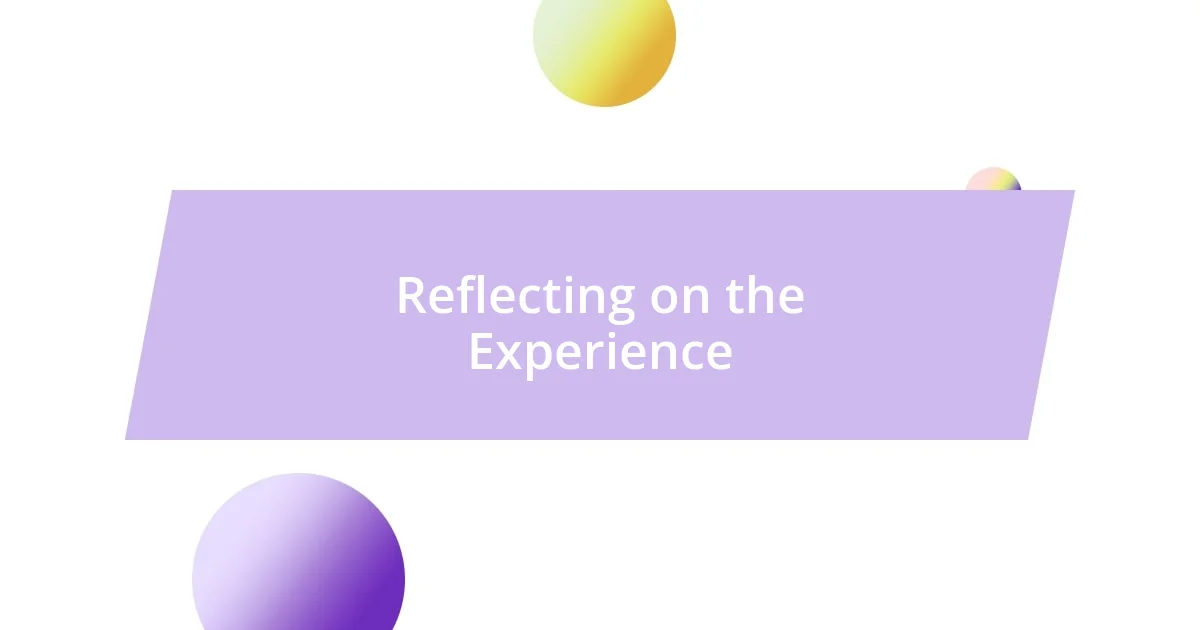
Reflecting on the Experience
Reflecting on the experience of my sessions often brings about a mix of emotions. I remember one particular session that didn’t go as planned; despite my preparation, I felt a wave of uncertainty wash over me. In moments like these, I’ve learned to embrace vulnerability. Have you ever experienced that? It can be daunting, but acknowledging those feelings helps me connect more deeply with others.
As I think back on my journey, I realize how valuable it is to track my growth. When I review past sessions, I spot patterns—some good and some not so great. Recently, I identified that I would often rush through my points when nervous. This self-awareness motivated me to slow down and pause for effect. It’s astounding how taking a breath can change the entire dynamic of a conversation. Does reflecting on your own experiences lead to similar revelations?
The power of self-reflection doesn’t stop at analyzing what went right or wrong. It also helps me celebrate small victories. I fondly recall a session where I facilitated an open discussion that sparked genuine excitement among participants. The energy was palpable, and I couldn’t help but smile. Reflecting on those moments reinforces my passion and reminds me why I do what I do. Isn’t it fulfilling to recognize the impact we can have on others?
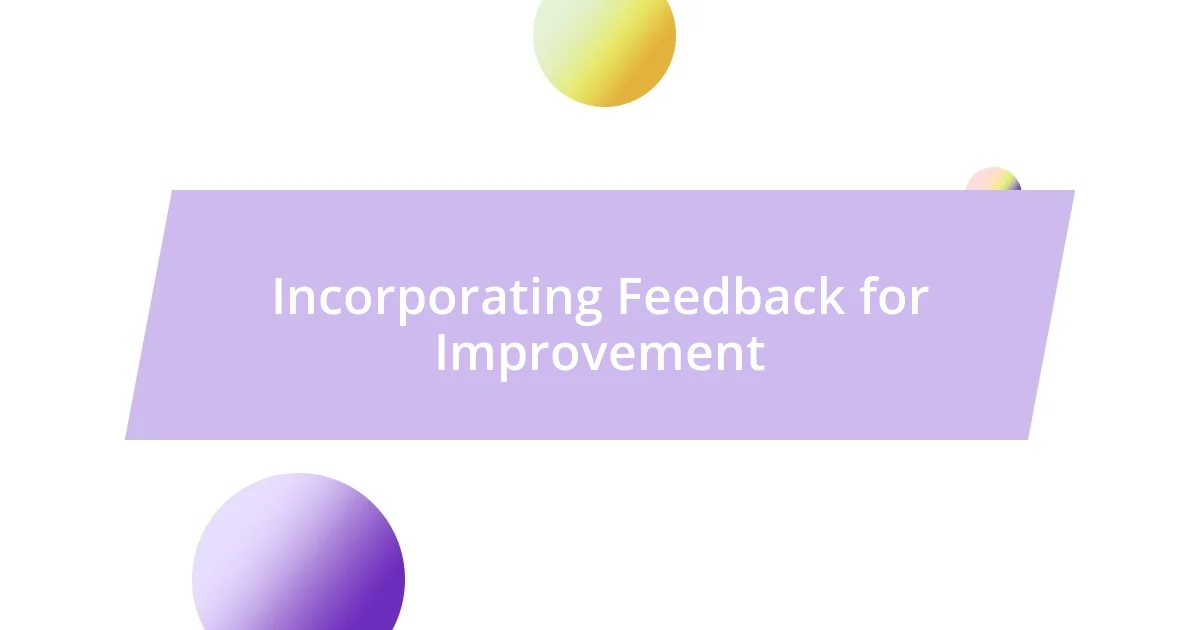
Incorporating Feedback for Improvement
Incorporating feedback into my sessions has been a transformative experience. I recall a time when an attendee mentioned they preferred more visual aids. Initially, I felt a tinge of defensiveness, but I took a step back and realized my goal is to make the content accessible. After adjusting my materials to include more visuals, I noticed an immediate uptick in engagement. Don’t you find that the simplest changes can often yield the most significant results?
Another instance stands out when feedback pointed out my tendency to interrupt. This was a painful realization, but it prompted me to practice active listening. By giving others the floor during discussions, I created a richer dialogue and fostered an environment where ideas flourished. Have you ever had a moment of clarity that changed your interaction style? For me, it was a game-changer in building trust and rapport.
Reviewing audience feedback isn’t always easy, especially when it stings. I remember one session where the critiques were harsh, but rather than dwell on disappointment, I used the opportunity to reflect deeply. I realized that improvement requires discomfort. Embracing the uncomfortable truth might be challenging, but isn’t the journey to growth worth it? After all, every constructive comment is a stepping stone toward becoming a more effective communicator.
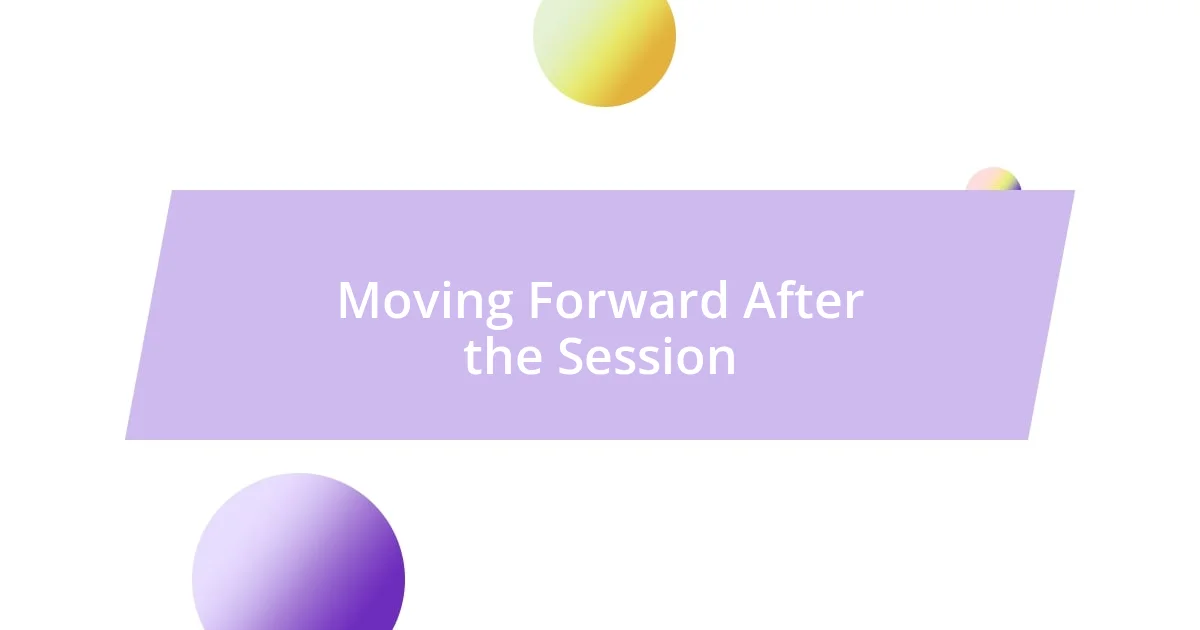
Moving Forward After the Session
After a session, I find it crucial to implement actionable steps. For instance, after a particularly challenging discussion, I jotted down specific strategies that could enhance my performance next time. This practice keeps me accountable and helps me avoid repeating past mistakes. Have you ever noticed how writing things down solidifies your commitment to change?
It’s also about maintaining that momentum. I’ve learned to share my takeaways with a trusted colleague for a fresh perspective. Recently, after discussing my thoughts on a session, my colleague offered insights that I hadn’t considered. That dialogue enriched my understanding and confirmed that growth often thrives in collaboration. Isn’t it fascinating how two minds can build on each other’s reflections?
I think there’s something empowering about setting new goals post-session. For example, after realizing I cut off speakers too often, I dedicated myself to an entire month of focused listening in meetings. Each session became a practice ground, and I could feel my communication skills evolving. How do you challenge yourself to grow after such experiences? It’s amazing to see how each small commitment can lead to significant improvements over time.







